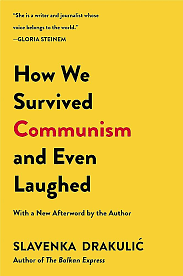You need to sign in or sign up before continuing.
Take a photo of a barcode or cover
I didn't get much humor from this book. It seemed a thoroughly bleak portrayal of women's lives under Eastern Block cummunism. The few instances of joy seem to come despite hardship and are hard-won. She does such a thorough job of describing the everyday lives of these women. It's very enlightening( in a very depressing way)
A nice snippet and look into the lives of women in the former Yugoslavia. I'd like to read her thoughts on women during the war. I loved her discourse on tampons and fur coats and making soup while lamenting how disappointing men are.
Через маленькі особисті трагедії жінок Славенка розкриває трагедію народів, яким не пощастило опинитися у комуністичній павутині.
Reading the male American reviews of this book was disheartening indeed. Beautifully written.
challenging
emotional
hopeful
informative
medium-paced
challenging
emotional
hopeful
informative
inspiring
reflective
tense
medium-paced
I've never felt so seen, and I'm surprised that a book about communist living is the one to capture it... it's definitely revealing but also sad.
Communism, in theory, is a good thing, to simply put it, it’s an “ideology of economic equality”. I don’t think you could find anyone who wouldn’t want that, assuming the rich aren’t aware of capitalism. However, as human beings, we’re selfish, we’re always hungry for more, and we have a Faustus complex that hinders us from practising equality. That’s why communism will always remain good in theory, but never in reality.
<i>How We Survived Communism and Even Laughed</I> unwraps the failures of a communist regime in creating a life for its people in Eastern Europe. Drakulic shares the lives of women under the communist regime at that time, and I thought it was an interesting take to focus on women only, but as I read I realized that with the few mentions on men under communism, women were essential in surviving a communist regime, that’s not to say that communism didn’t affect men. But from the shopping, the clothing, the make-up, the children, to the cooking; women were the source of life. They were resourceful, they thought ahead, saved for the rough times, made the most out of the little they had, and without their tricks for living, the communist regime might have broken them. I guess this sound like I’m romanticizing their poverty in a way, but I really am admiring their resilience.
This book has got to be the most relatable book I’ve read in a while – not that I read much anymore! In the book, Slavenka Drakulic writes in a very simple form, yet incredibly frightening to believe that this isn’t a dystopian novel but real life! It’s even more frightening to relate to it as an Egyptian in the 21st century.
Communism, in theory, is a good thing, to simply put it, it’s an “ideology of economic equality”. I don’t think you could find anyone who wouldn’t want that, assuming the rich aren’t aware of capitalism. However, as human beings, we’re selfish, we’re always hungry for more, and we have a Faustus complex that hinders us from practising equality. That’s why communism will always remain good in theory, but never in reality.
<i>How We Survived Communism and Even Laughed</I> unwraps the failures of a communist regime in creating a life for its people in Eastern Europe. Drakulic shares the lives of women under the communist regime at that time, and I thought it was an interesting take to focus on women only, but as I read I realized that with the few mentions on men under communism, women were essential in surviving a communist regime, that’s not to say that communism didn’t affect men. But from the shopping, the clothing, the make-up, the children, to the cooking; women were the source of life. They were resourceful, they thought ahead, saved for the rough times, made the most out of the little they had, and without their tricks for living, the communist regime might have broken them. I guess this sound like I’m romanticizing their poverty in a way, but I really am admiring their resilience.
This book has got to be the most relatable book I’ve read in a while – not that I read much anymore! In the book, Slavenka Drakulic writes in a very simple form, yet incredibly frightening to believe that this isn’t a dystopian novel but real life! It’s even more frightening to relate to it as an Egyptian in the 21st century.
<i>“The reality is that communism persists in the way people behave.”</i>
I haven’t lived in a communist society, but I think that I and a lot of Egyptians are a product of indirect communist beliefs. As I was reading this book, I realized that I had had a communist upbringing. I am not even sure my parents were aware of that. They were always saving for something, even now, saving for a car, for a house, for a “necessity”, and when there’s nothing to save for, it’d be “just in case something happens”. I am now 24 years old and doing the exact same thing. There’s always that fear of “What if it all went down? Where’s the safety net?” Despite knowing that nothing could ever help if worse come to it, you just can’t stop wondering in fear. Even though I live in a capitalist society (which is no better), the luxury of living in the moment or taking “entrepreneurial risk” was never an option for me, it was never even thought of before.
It isn’t just the saving though, it’s the great re-usage of <b>everything</b>, the unspoken “no waste” rule. It’s the fear that gnaws at you and you want to scream, but you know that <i>“big brother is watching”.</i> It’s the insufferable censorship and the unyielding government propaganda. It’s the weirdly intimate and very realistic shift to a <i>Golub.</i> It’s the growing mistrust you feel with everyone you meet. That even if you both are on the same side, there’s this fear that one of you is a whistleblower.
It’s quite sad to read this and relate to it indeed, especially now that many of the Arab world is rising against their own oppressors, and Egypt is still in limbo. Drakulic said <i>“The People’s personality shaped by the communist regimes they lived under are slower to change” </i>and I guess this is why <i>sometimes</i> revolutions fail. Because it’s not the removal of who’s in power that will bring forth the stability, and the humane living conditions we deserve, it’s the change of our mindset and the lack of slacking that will do.
After the trip to Croatia in July, I wanted to know how the life was for Croatians during the Communism period(I was trying to find books about overall Croatian history but hard to find them in the US).Now Croatia looks lovely and peaceful but it certainly still has some scars underneath the beautiful exterior. Also, I have visited several pre-communist countries such as Hungary, Czech, Slovakia and Poland as well and also curious about the cultural difference between pre and post communism era.That was the main motivation to read this book.
Slavenka, the author of this book ,who is a Croatian female journalist, delivered several interesting and eye opening stories about lacking in quality of the female lives in countries under Communism( e.g. insufficient toilet papers or women sanitary items). However, I felt her book does not provide complete pictures of the everyday lives of ordinary people as most of the stories were based on her own experience and some stories that she heard from her acquaintances. At the end, the series of anecdotes were kind of repetitive.
Slavenka, the author of this book ,who is a Croatian female journalist, delivered several interesting and eye opening stories about lacking in quality of the female lives in countries under Communism( e.g. insufficient toilet papers or women sanitary items). However, I felt her book does not provide complete pictures of the everyday lives of ordinary people as most of the stories were based on her own experience and some stories that she heard from her acquaintances. At the end, the series of anecdotes were kind of repetitive.
"She bought her staples, too: chocolate bars, a bottle of vodka, and cookies. 'I'll just sit in front of the TV tonight and wait for the military coup. I only hope that by the time it starts, I'm dead drunk,' she said. She was standing in my doorway, all of her defenses against the war contained in a single paper bag"
An intimate and diverse look at women during the 50-80's of communist USSR. Drakulić's prose are both poignant and captivating. There were many sentences that had me stopping and thinking. The book makes you reevaluate your own life, as well as connect to women living in the harsh poverty of this area and time.
An intimate and diverse look at women during the 50-80's of communist USSR. Drakulić's prose are both poignant and captivating. There were many sentences that had me stopping and thinking. The book makes you reevaluate your own life, as well as connect to women living in the harsh poverty of this area and time.
A nice snippet and look into the lives of women in the former Yugoslavia. I'd like to read her thoughts on women during the war. I loved her discourse on tampons and fur coats and making soup while lamenting how disappointing men are.
challenging
informative
reflective
sad
medium-paced





